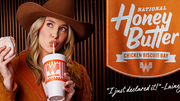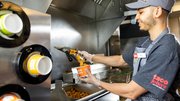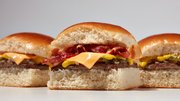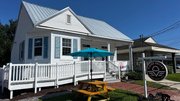Article
Lessons from a prolific, international restaurant franchisee
The president of QSR International says offering a breakeven promotion around a beverage is the 'most intelligent thing you can do' going into a new market.

December 2, 2014 by Alicia Kelso — Editor, QSRWeb.com
While working for Yum! Brands as both a franchisee and Master Franchisee, Richard Eisenberg racked up about 2 million airline miles in four years. The now-president of QSR International claims that his experience with the global restaurant company – and before that PepsiCo – was the "best education" he's ever received.
Now Eisenberg oversees a Master Franchise company that operates big-named brands such as KFC, Quiznos and Smashburger in more than 35 countries.
Going international
As evidenced by his frequent flier status, most of Eisenberg's experience is international. He moved to Costa Rica in 2000 and QSR International was founded shortly thereafter. Costa Rica has since become one of the company's most successful markets.
The AUVs at Quiznos, for example, are twice as high in Costa Rica as they are in the US. Within QSR International's Latin and Caribbean markets, the company is expanding the brand's drive-thru presence, which is expected to yield even higher volumes.
A new drive-thru unit is currently under construction in Guadalupe, San José, Costa Rica. It will incorporate a new dual equipment line which has reduced service times by 40 percent.
"We developed a new, dual-sided equipment line which, with improvements to POS and 'on the fly' kitchen monitors, has significantly improved speed of service, enabling us to build more drive-thrus," Eisenberg said.
Much of the international success is driven simply by opportunity.
"In Latin America, it's about 15 to 20 years behind the US, so it's way behind in terms of competition and development. There is a lot of opportunity," he said.
But that doesn't mean it's easy. Einsenberg's company invests a lot of money in restaurant updates and tries to complete remodels every 5 years, a pace that leaves US remodeling efforts in a pile of dust.
"People think international markets are easier to do business in because there is success and the volumes are higher and the big guys are doing it," he said. "But we work hard at it. We don't let the brand get old. We're constantly reinventing the menus."
Also, the franchisor/franchisee relationship can trip up any effort.
"A lot of brands now are trying to go international, but the franchisor support isn't as strong and the franchisee has to do a lot of the complex work, such as media planning, sourcing, distribution," he said.
Owning QA
One of the major differences for operators diving into international waters is in having more ownership over quality assurance. As the entire industry witnessed with Yum! Brands China and its two supply chain crises in the past two years, this can add even more complexity. Still, at the end of the day, Yum's standards far outpace local standards in most markets, Eisenberg said.
"Franchisees own quality assurance, inspections on vendors and suppliers. Work with a longterm supplier, which allows you to get a vendor and get your standards up. You want to get them up to a Yum! Brands or McDonald's level for inspection. If you can pass those brands' inspections, you can pass anyone's inspections," he said.
His KFC and Smashburger restaurants in many Latin American markets, for example, have hand sinks operated via a knee or foot – pretty standard domestically, but not internationally.
"Think of a place that is still undeveloped, they're just not going to have the highest food safety standards, especially compared to bigger brands," Eisenberg said.
Remodels and breakeven offers
Two other significant components of running an international business for Eisenberg include: frequent remodeling/refreshing and ensuring trial.
Every five years, QSR International remodels most of its stores. Eisenberg admits this is "tough to afford," but constantly puts money away to do so, out of necessity.
"Consumer behavior is always changing so we're meeting their demands," he said.
He said, for example, one of his KFC units faced new competition when a McDonald's opened up on the same street in Costa Rica. The KFC restaurant experienced negative sales right after the McDonald's debuted, but now is up 10 percent because of investments that were made, including self-order kiosk installments.
"You have to build your facilities so you know they'll still be relevant and cost effective five years from now," he said.
Eisenberg also relies on another tried and true method to drive sales, one that's a bit less costly – breakeven offers.
"If we go into a new country or with a new brand, I'll offer free entrée, like a burger, with the purchase of a medium drink. The margins are so high on drinks that a free entrée is breakeven. Drinks are very profitable," he said. "This type of promotion is my favorite thing to do because it puts the product in consumers' mouths and gets them to try the brand without cost. It's cost neutral."
Offering a breakeven promotion around a beverage, he adds, is the "most intelligent thing you can do going into a new market."
Eisenberg said he is currently looking at some domestic opportunities, and is hoping to find a franchisor to work with in the fast casual segment specifically.
"Fast casual is a great example of what consumers want right now," he said. "You have to be in business for them. The amount we spend on consumer research is insane, but it's so important today."
 ChatGPT
ChatGPT Grok
Grok Perplexity
Perplexity Claude
Claude








